Robert A. Heinlein was a question-asker.
 I consider Robert Heinlein’s most fascinating novel to be his prescriptive utopia Beyond This Horizon. (A prescriptive utopia is where an author “prescribes” what he or she believes a better civilization would look like.) While Heinlein did opine, extensively, about society in many books, from Starship Troopers to Glory Road, it is in Beyond This Horizon that you’ll find him clearly stating This Is The Way Things Ought To Be.
I consider Robert Heinlein’s most fascinating novel to be his prescriptive utopia Beyond This Horizon. (A prescriptive utopia is where an author “prescribes” what he or she believes a better civilization would look like.) While Heinlein did opine, extensively, about society in many books, from Starship Troopers to Glory Road, it is in Beyond This Horizon that you’ll find him clearly stating This Is The Way Things Ought To Be.
And it turns out to be a fascinating, surprisingly nuanced view of our potential future.
Like most Heinlein novels, Beyond This Horizon divides pretty evenly into two parts and it is only the second half that I hold in high regard. Heinlein wrote the first half at behest of the famed editor of Astounding Magazine, John W. Campbell, who was then holding forth on one of his favorite themes . . . that “an armed society is a polite society.”
 In pushing this strange notion, Campbell was behaving very much like his arch-nemesis, Karl Marx. A few anecdotes and a good just-so story outweigh a hundred historical counter-examples. But no matter. Heinlein did as good a job of conveying Campbell’s idea in fiction as anybody could. So much so that the first half of Beyond This Horizon has been cited by state legislators in both Texas and Florida, proposing that all citizens go around armed! Naturally, this leads (paradoxically) to a wild shoot-em-up, in the first half of Beyond This Horizon… which RAH suddenly veers away from at the midway point.
In pushing this strange notion, Campbell was behaving very much like his arch-nemesis, Karl Marx. A few anecdotes and a good just-so story outweigh a hundred historical counter-examples. But no matter. Heinlein did as good a job of conveying Campbell’s idea in fiction as anybody could. So much so that the first half of Beyond This Horizon has been cited by state legislators in both Texas and Florida, proposing that all citizens go around armed! Naturally, this leads (paradoxically) to a wild shoot-em-up, in the first half of Beyond This Horizon… which RAH suddenly veers away from at the midway point.
 This division between halves is typical of Heinlein novels and it makes reading them an interesting, multi-phase experience. Generally, RAH was a master at starting his tales–in fact, I recommend that all neo writers study carefully the first few pages of any Heinlein tale, for his spectacularly effective scene-setting and establishment of point-of-view. (The opening scene of The Star Beast is the best example of show-don’t-tell that anyone can find.) Alas, most of his novels reach a vigorous climax, concluding part one… and then peter out disappointingly in the last half, amid a morass of garrulous talk.
This division between halves is typical of Heinlein novels and it makes reading them an interesting, multi-phase experience. Generally, RAH was a master at starting his tales–in fact, I recommend that all neo writers study carefully the first few pages of any Heinlein tale, for his spectacularly effective scene-setting and establishment of point-of-view. (The opening scene of The Star Beast is the best example of show-don’t-tell that anyone can find.) Alas, most of his novels reach a vigorous climax, concluding part one… and then peter out disappointingly in the last half, amid a morass of garrulous talk.
But this is where Beyond This Horizon reverses all expectations. Sure, part one is action and part two is talk, as usual… only in this case, the action is silly and the talk is terrific! In fact, this is where Robert Heinlein displays how broad his intellectual reach can take us.
 Here we see the clearest ever expression of his political philosophy, which is demonstrably neither “fascist” nor anywhere near as conservative as some simple-minded critics might have us think.
Here we see the clearest ever expression of his political philosophy, which is demonstrably neither “fascist” nor anywhere near as conservative as some simple-minded critics might have us think.
Indeed, his famed libertarianism had limits, moderated and enriched by compassion, pragmatism and a profound faith that human beings can improve themselves, gradually, by their own diligence and goodwill.
 I was amazed by many other aspects of this wonderful book-within-a-book, especially by Heinlein’s startlingly simple suggestion for how to deal with the moral quandaries of genetic engineering — what’s now called the “Heinlein Solution” — to allow couples to select which sperm and ova they want to combine into a child, but to forbid actually altering the natural human genome.
I was amazed by many other aspects of this wonderful book-within-a-book, especially by Heinlein’s startlingly simple suggestion for how to deal with the moral quandaries of genetic engineering — what’s now called the “Heinlein Solution” — to allow couples to select which sperm and ova they want to combine into a child, but to forbid actually altering the natural human genome.
Thus, the resulting child, while “best” in many ways (free of any disease genes, etc), will still be one that the couple might have had naturally. Gradual human improvement, without any of the outrageously hubristic meddling that wise people rightfully fear. It is a proposal so insightful that biologists 40 years later are only now starting to discuss what may turn out to be Heinlein’s principal source of fame, centuries from now.
 When it comes to politics, his future society is, naturally, a descendant of the America Heinlein loved. But it has evolved in two directions at once. Anything having to do with human creativity, ambition or enterprise is wildly competitive and nearly unregulated. But where it comes to human needs, the situation is wholly socialistic. One character even says, in a shocked tone of voice: “Naturally food is free! What kind of people do you take us for?”
When it comes to politics, his future society is, naturally, a descendant of the America Heinlein loved. But it has evolved in two directions at once. Anything having to do with human creativity, ambition or enterprise is wildly competitive and nearly unregulated. But where it comes to human needs, the situation is wholly socialistic. One character even says, in a shocked tone of voice: “Naturally food is free! What kind of people do you take us for?”
None of this fits into the dogma of Ayn Rand, whose followers have taken over the libertarian movement. If Robert Heinlein was a libertarian, it was clearly of a more subtle kind, less historically or anthropologically naive, more compassionate… and more interesting.
But here’s the crux. For the most part, with Robert Heinlein, you felt he wasn’t so much lecturing or preaching as offering to argue with you! His books let you fume and mutter and debate with this bright, cantankerous, truly American soul, long after his body expired.
 And this joy in argument – in posing and chewing over thought experiments – is the very soul of what it means to be a writer or reader of science fiction.
And this joy in argument – in posing and chewing over thought experiments – is the very soul of what it means to be a writer or reader of science fiction.
Finally, for more about Heinlein, see the extensive new two-volume biography by William H. Patterson, Jr.:
Robert A. Heinlein: In Dialogue with His Century: Vol. 1 (1907 – 1948): Learning Curve., followed by volume two:
Robert A. Heinlein: In Dialogue with His Century: Vol. 2: The Man Who Learned Better, 1948 to 1988.
–David Brin



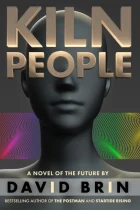

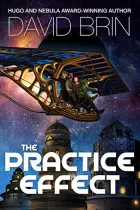




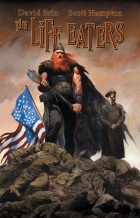
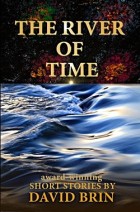
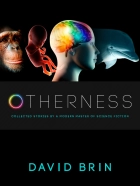
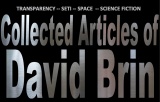
Heinlein’s “politics” had two important elements. The first was a willingness to explore numerous types of societal structures. Venus is a corporate state (much like The Golden Rule space station in “The Cat Who Walked Through Walls), whereas Luna was a libertarian Wild West — and in “Starship Toopers,” citizenship was dependent upon federal service (although the only difference between citizens and non-citizens was that non-citizens couldn’t vote). In each instance there were benefits and problems.
The other element was a deep and abiding knowledge that that social systems and technologies were inherently unstable. The rolling roads become dinosaurs strewn across the landscape; Luna becomes increasingly more bureaucratic.
Inconsistencies were his one consistency. Hard core individualists, such as Lazarus Long, unabashadly try to control other people and often even eavesdrop on their conversations. Scientists are often heroes, but so too are uneducated fundamentalist Christians, such as Aunt Lilybet, driver of the rolligon bus, the Hear Me Jesus. The sympathetic doctor in “Red Planet” wears a tinfoil hat whereas Slipstick Libby would consider such behaviour illogical.
Basically, I think you’re only partially right when you say that Heinlein was “offering to argue with you!” A closer appraisal might be that he was in a constant state of arguing with himself, and we lucky readers were merely granted the honour of listening in.
There is an example of his ideas that seem particularly relevant these days, I can’t remember the details very well, but it was a discussion about he and his wife’s visit to Russia and how they independently, along different lines, came to the conclusion that the CIA analysis of the strength of the Soviet’s industrial base, and thus the threat they really posed, was grossly over-exaggerated. Lately, we are treated to repeats of this in the constant spewing about the dire threats of terrorism. After the trillions of dollars spent to protect us from the Soviet ‘menace’, it is rather curious our defense budgets have steadily increased since the Soviet Union collapsed. Was it some kind of Potemkin Village that fooled all of our intelligence machine for decades? Where would the deception be more likely? Haven’t we recently had repeated demonstrations of intelligence officials lying about pretty much everything to justify whatever it is that they’re doing or want to do?
I loved Heinlein, my early love of science fiction reading, starting back in grade school, late 60’s early 70s, was nourished most by his works. And still, it isn’t rare at all for memories of his writings to get yanked out of my decaying brain by some event or something someone says. Great piece, thanks for that reminder.
Heinlein is my go to author when I need a science fiction fix. “Beyond this Horizon” was the one title I could never find in local bookstores. Finally reading it on Kindle. What’s interesting is the correlation between the leaders of the coup attempt and those in Nazi Germany. Both thought highly of themselves genetically and intellectually, yet couldn’t see the oxymoron staring back at them in the mirror. Tell a lie enough times and people begin to believe it. Problem was, they began to believe their own lie. What really had me wanting to read this book in particular, is the armed society outlook. It would be interesting to see this in movie form, as long as they don’t do to it like they did to Starship Troopers.
I have a quibble about whether Ayn Rand’s followers have taken over the libertarian movement. This is a subject about which many people disagree. Ayn Rand publicly disavowed libertarianism, and it is not necessarily ‘Folks, we are all libertarians now.’ If you are goin to mention the dogma of Ayn Rand, then fine, maybe dogma is a bad thing, but her justification of the state is derived from a Hobbesian state of nature theory, or, Ayn Rand’s belief in the inherent depravity of human nature which renders us forever incapable of living without rulers and not descending to the level of `savages’. I don’t think this was meant to charm David Brin, but nevertheless, that’s becasue it is closer to Hobbes, Hegel, and Marx, than to libertarianism.